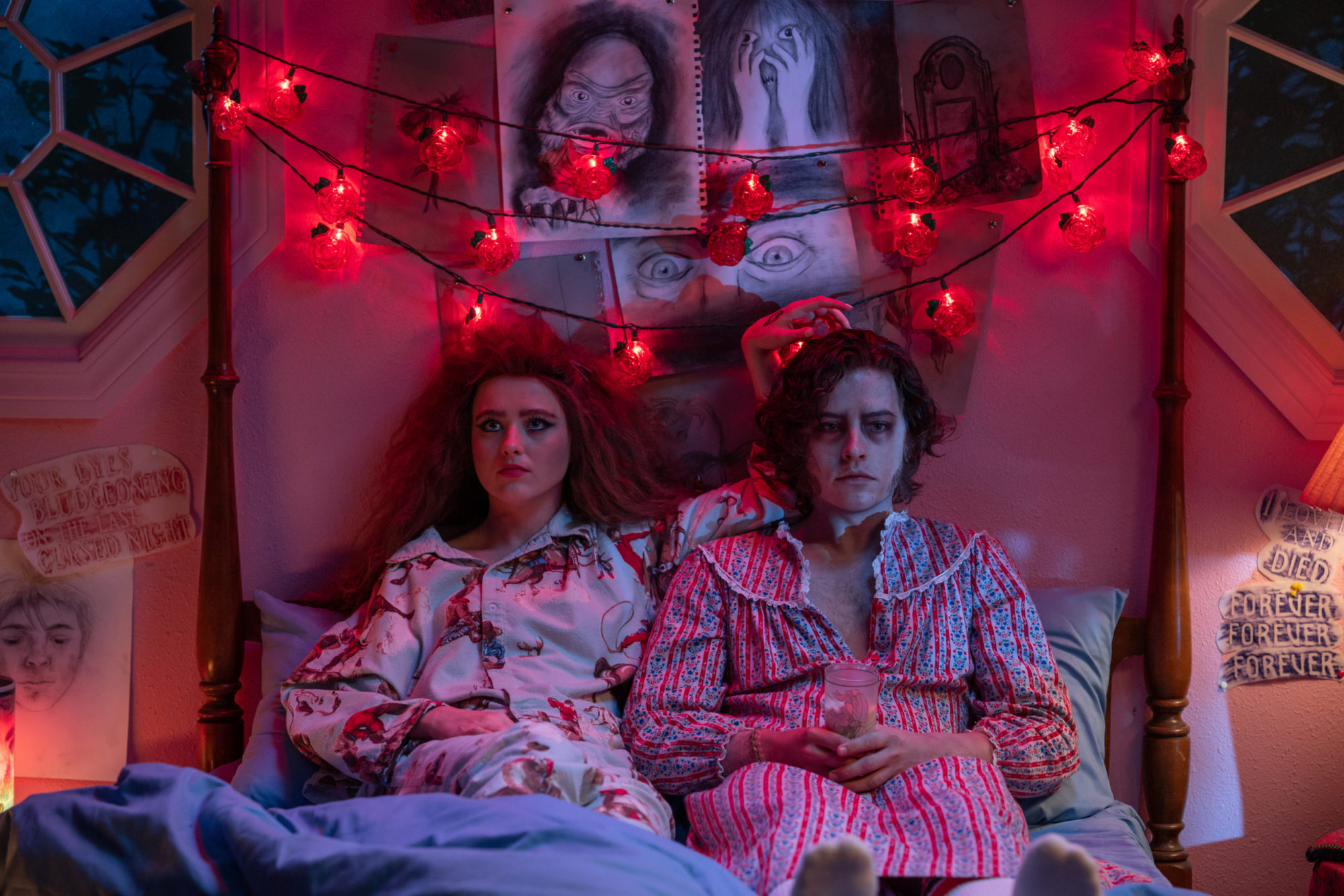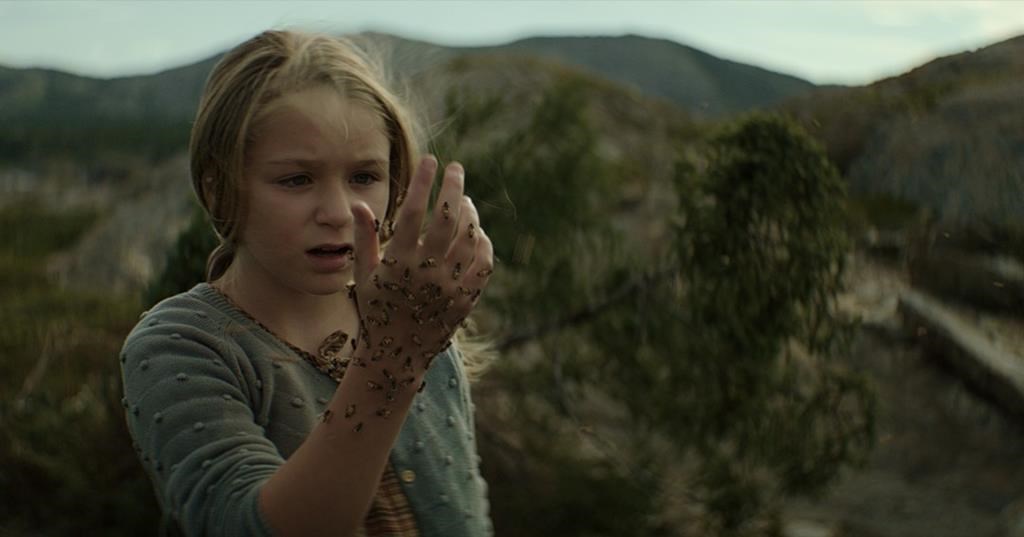Reviews
‘Lisa Frankenstein’ Review – Diablo Cody’s Sugary Sweet Zom-Com Captures the ’80s

Billed as a coming-of-rage tale, Lisa Frankenstein instead offers a celebration of outcasts and weirdos. Jennifer’s Body scribe Diablo Cody and director Zelda Williams, making her feature debut, wear their cinematic influences on their sleeves for a raucous zom-com that manages to go beyond references and aesthetics to capture the essence of ’80s cinema in a way few manage, for better and worse. It makes for a sugary sweet, almost wholesome effort held together by a trio of infectiously winsome performances.
Like most teens, Lisa Swallows (Kathryn Newton) is simply trying to navigate the perils of high school while adjusting to her new home life now that her dad (Joe Chrest) has remarried a wicked stepmother (Carla Gugino) and given her an unwaveringly perky stepsister in popular cheerleader Taffy (Liza Soberano). Unlike most teens, Lisa’s new domestic setup comes right after her mother was gruesomely murdered while she was home, leaving her still reeling from the trauma and loss.
To escape the noise, Lisa often retreats to an old cemetery in the woods, where she frequents the grave of a young man who died in 1837. As luck would have it, a drug-induced wish by Lisa one stormy night winds up resurrecting the undead Creature (Cole Sprouse). It sends the pair down a wild path toward love that comes paved with dead bodies and a tanning bed.

While Lisa Frankenstein draws obvious influence from Heathers, Weird Science, and the films of Tim Burton, with Williams employing Burtonesque animated sequences to fill in some necessary backstory, it’s most indebted to John Hughes. Like Sixteen Candles, there’s a matter-of-factness to the escalating madness that plays like a series of strung-together vignettes of teen angst and comedy. Cody’s script throws a lot at its characters, who remain largely unflappable in the face of bizarre occurrences.
In true ’80s fashion, this is a world where anything can happen, and the characters roll with the punches. That ultimately lends accuracy to the era, but it can be a bit jarring for contemporary audiences. Lisa Frankenstein is more interested in capturing big emotions and character arcs versus tidy, cohesive storytelling. That also means that it can be tonally disjointed, never quite knowing when to pull its punches for its younger audience or go full throttle on the weirdness.
While the adults take on the more familiar archetypes of ’80s parents, it’s the central teen players that shake up the mold. Cole Sprouse finds impressive ways to imbue his resurrected Creature with a vibrant personality through an almost entirely physical performance. That only deepens the more the Creature’s quest for body parts evolves. But Creature is the straight man to the eccentric and increasingly uninhibited Lisa. Lisa Frankenstein is at its most effective when it focuses on the comedic partnership between Sprouse and Kathryn Newton, their unique dynamic earning laughs and audience sympathy. Liza Soberano is also a standout. Taffy is a far cry from the stereotypical popular mean girl and winds up becoming a secondary protagonist thanks to Soberano’s winsome portrayal.

Less effective is the central romance. Because Lisa Frankenstein moves at a brisk pace and takes narrative leaps to maintain it, the budding romance between Lisa and Creature feels more like hormonal convenience. Newton and Sprouse may have comedic chemistry, but it doesn’t quite translate to romantic love. That’s okay because this is a zom-com penned by Diablo Cody, which means that it’s far more effective when exploring what it’s like to be a teenage girl dealing with big emotions. Newton capably handles Cody’s rapid-fire dialogue, and considering what a chatty motormouth Lisa is, that’s no small feat.
As a celebration of teen girls and outcasts who just want to be loved, Lisa Frankenstein ultimately charms. The commitment to capturing that anything-goes vibe of the ’80s kicks things off to a rocky start, and the epic love story between a dead guy and goth girl falls short, but Newton is so magnetic that you’re hard pressed to care. Toss in a vibrant production design by Mark Worthington, Cody’s wit, and Williams’ careful threading of contrasting visuals, and you’ve got a cute, quirky, disjointed and harmless dark comedy that’s less interested in fluid storytelling than it is championing teen weirdos and outcasts through an ’80s vibe.
Lisa Frankenstein releases in theaters on February 9, 2024.


Reviews
‘The King Tide’: An Island Town Rots with Moral Decay in Canadian Folk Horror Fable [Review]

The opening scenes of director Christian Sparkes’ The King Tide set an ominous tone: a powerful storm takes down the power lines of a small island town as a pregnant woman loses her child while her dementia-suffering mother sits nearby. In the morning, as the town takes stock of the damage and the power is restored, a surprising discovery is found in an overturned boat in the harbour: a baby girl…with the ability to heal.
Writers Albert Shin and William Woods, working from a story by Kevin Coughlin and Ryan Grassby, treat the story as something of a morality tale mixed with a fable. Following the cold open, the action jumps ahead 10 years at a point when the unnamed island (the film was shot in Newfoundland, Canada) is thriving. The fishing is bountiful, the islanders are self-sufficient and have cut ties with the mainland, and most everyone is happy.
As characters are prone to saying, it’s all thanks to Isla (Alix West Lefler), the miracle baby who has grown up worshipped by the islanders. While Mayor Bobby Bentham (Clayne Crawford) and his wife Grace (Lara Jean Chorostecki) endeavor to raise Isla like any other little girl, the reality is that the island’s entire ecosystem revolves around her miraculous powers. It is only because of Isla that they survive; every aspect of their lives – from medicine to food – relies on her.
Each day the citizens line up for their allotted time with the young girl – be it to stave off breast cancer, like Charlotte (Kathryn Greenwood), or recover from another night of heavy drinking like former doctor, Beau (Aden Young). There’s even a predetermined schedule for when she will go out on the boats and use her power to lure fish into the nets.

One fateful day, Bobby succumbs to peer pressure and alters Isla’s schedule at the last minute to accompany cod fishermen Marlon (Michael Greyeyes) and Dillon (Ryan McDonald). A childish game with fatal consequences is played, but with Isla indisposed, a young boy, who would have otherwise been fine, dies. And while the rest of the community grieves, it is Isla who is completely shaken and, unexpectedly, loses her powers.
Suddenly the entire balance of the island is thrown off. Folks like Grace’s mother, Faye (Frances Fisher), who relied on Isla to keep her dementia at bay, suddenly reckon with mortality, while the food security of the town is called into question. Faye’s late-night “support group” meetings take on an urgent and secretive tone and the townspeople claim ownership of Isla’s time despite Bobby and Beau’s protests that she needs rest to recover from her trauma.
Like the best thrillers, the politics and personalities within the community come into play as morals are compromised and the good of individuals vs the collective is played out in increasingly desperate situations. The King Tide excels because it is interested in exploring the competing motivations of the townspeople, while also resolutely refusing to paint anyone as inherently good or bad. These are desperate people, determined to remain independent and free from outside interference, while protecting their trapped-in-amber way of life.

These developments work because there’s a humanity to the characters and The King Tide wisely relies heavily on its deep bench castoff character actors to drive the conflict. Crawford is the de facto protagonist of the ensemble and he’s also the most straightforward character: Bobby is a good man and a loving father, but he’s no white knight. At several points in the film, his willingness to acquiesce to the demands of the community and retain his power causes events to spiral further out of control.
Even more fascinating are Grace and Faye, two commanding women whose capacity for maternal love is matched – or eclipsed – by their own self-interests. A mid-film discovery about Isla’s power reframes Grace’s priorities, ultimately pitting her against her husband. As a result, Grace is incredibly compelling and frustrating (in a good way) and Chorostecki, who has done great genre work on both Hannibal to Chucky, plays the moral ambiguity exactly right. Grace is a fascinating and flawed human character in a film filled with them.
The same goes for Fisher, who deftly balances Faye’s grandmotherly love for Isla with the needs of the community and, by extension, her own health demands. In the hands of a lesser performer, it would be easy to hate Faye for her actions, but Fisher’s performance perfectly captures the fierce determination and fear that drives the island’s matriarch.
Finally, there’s Aden Young, The King Tide’s secret weapon. The ten-year jump reveals that Beau has undergone the most significant transformation: while everyone else has benefitted from Isla’s powers, her presence has eliminated the need for a doctor. With the clinic effectively shuttered, Beau has become an alcoholic; a shell of his former self with no purpose.
Like Bobby, Beau is the easiest character to root for because of his selfless desire to protect Isla, but Young (renowned for his work with Crawford on Rectify) unlocks the character’s tragic pathos and, in the process, becomes the film’s emotional anchor.

Framing the moral decline of the islanders and anticipating the unexpectedly devastating climax is the natural beauty of Newfoundland. As shot by cinematographer Mike McLaughlin, there’s a steely beauty to the geography, resplendent with rocky cliffs, pounding surf, and gusty bluffs that reinforce the islanders’ isolation.
There’s a fierce pride in their struggle to survive independently, evident in the simple lodgings and the antiquated alarm bell that is rung whenever fishing ships from the mainland stray too close. It’s a chilly, atmospheric calling card for one of the most picturesque provinces in Canada, but it is a perfect complement for the folk horror narrative.
Armed with serene, beautiful cinematography, murky moral developments, and a deep bench of talented character actors, The King Tide is a quiet gem that demands to be seen. It’s one of the year’s best genre films.
The King Tide is in theaters April 26, 2024.














You must be logged in to post a comment.